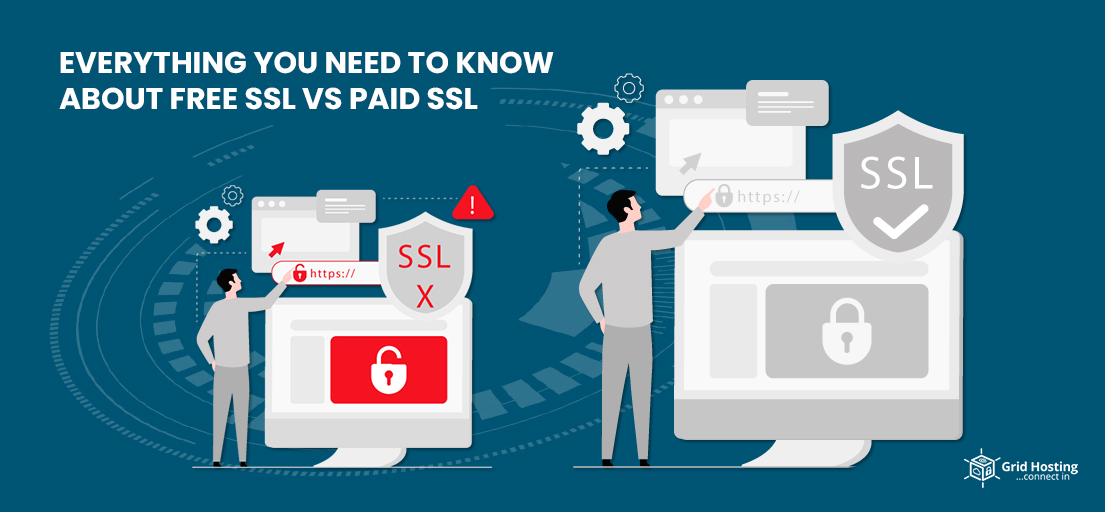Cybercrimes are increasing day by day. As a result, website owners are now much more concerned about security. Hacking attempts are routine, so SSL certificates are more necessary than ever. They are like website prerequisites. SSL certificates are a security shield and serve as your SEO agent. As a result, you can rank higher on Google and other search engines.
Most people also know that there are types of SSL certificates. One is free, and the other is paid. But, one commonly asked question is why to go for paid when free is available. This article will answer the same question by discussing both types in detail.
Free SSL Certificate
Of course, you do not have to pay anything for SSL certificates. The reason for providing it for free is to make HTTPS available for all websites.
There are two types of free SSL certificates. The first one is a self-signed certificate. As the name implies, the buyer signs them rather than any authority. Certificate authorities sign the other type.
There is no difference between the encryption levels of paid and free SSL certificates.
Paid SSL Certificates
Authorities sign these certificates, and the buyers have to pay for them. Both resellers and certificate authorities sell paid SSL certificates. We have just talked about similar encryption levels of free and paid SSL. It is natural to think why one should pay when there is no advanced encryption level. Let us see what better you can have by getting paid SSL.
Critical Differences Between Free SSL and Paid SSL
Well, here are the notable differences between free and paid SSL.
Type of SSL Certificate
There is no variety in free SSL certificates. There is only one type called domain validation. They provide a basic authentication level and are commonly used for blogs and small websites. Moreover, there is no provision for Organization Validation (OV) and Extended Validation (EV) certificates. You need them if you have to secure an extensive business website. If you go with paid SSL, you get both of them. In other words, free SSL only suits when you have a tiny website or a blog. It won’t be enough when dealing with a vast eCommerce business.
Level of Validation
If you go for free SSL, the certificate authority will not go into details of the website owner’s business. Instead, they will validate the ownership of the domain. Website owner is not a concern for them. However, things are different in the case of paid SSL certificates. It goes far beyond the business owner’s identity in the case of OV or EV certificates. Certificate authorities perform in-depth verification of the business as well.
Validity Period
Validity periods are also different. For example, the free SSL certificates provided by CAs are valid for only between 30 to 90 days. So website owners renew after 30 to 90 days. However, it can extend between one to two years if you go for a paid certificate.
Support
Resellers and certificate authorities of paid SSL certificates provide expert-level support. Clients are free to choose the medium of support they like. It could be either chat, email, or call. The level of support will not be that impressive if you go with a free SSL certificate. It is not affordable for them. When you need help, you may have to check old forum posts to find it.
Level of Trust
We know that free SSL certificates only provide domain-level validation. Websites that need EV and OV certificates have to get a paid SSL certificate. These certificates will also provide you with visual indicators—certificate information, better site seals, and business names in the URL. Free SSL certificates do not offer such benefits.
Warranty
Paid SSL is a much more safe option than the free certificate. If things go wrong with the free SSL certificate, you are totally on your own. It could be PKI failure, for example. Such problems won’t arise in paid SSL certificates. You get proper guarantees.
Which SSL/TLS Certificate is Ideal for E-commerce Websites?
Ecommerce businesses also need to gain clients’ trust, just like physical shops. Trust is essential in any professional relationship. When trust is not there, customers will not reveal their sensitive information. For example, customers do not enter credit card information on a website they do not trust. Today’s end-user is smart enough to recognize the visible website security signs. Therefore, they can differentiate between legit and trusted websites from the opposite ones.
So research well to find the best-paid SSL certificate for your business websites. Paid SSL/TLS certificates of legit authorities that provide OV and EV verify the organization in-depth. Moreover, they offer visible trust indicators like site security seals. Also, you get to see the organization’s name in the browser’s address bar. Thus, users feel safe and do not hesitate to share their information. You will never enjoy this in free SSL certificates. Moreover, 24*7 technical support makes paid SSL/TLS support the best choice for eCommerce websites.
However, a free SSL certificate will also be enough if you have a small website or a blog. Therefore, you can make the best business decision by checking your requirements first.
In short, the paid versions offer many advantages that free SSL does not. You get better support, and increased validity period, and comprehensive validation.
For Discounts and Offers Visit Our Official Facebook Page at GridHosting







